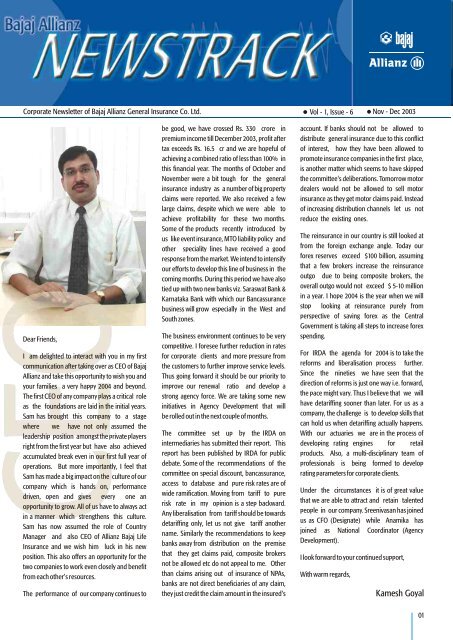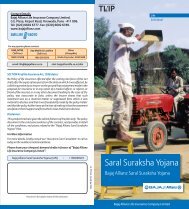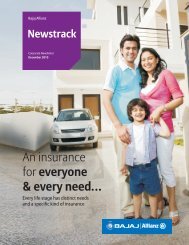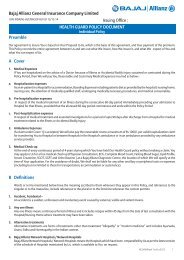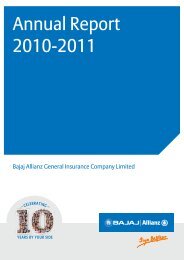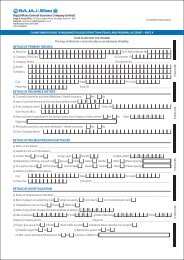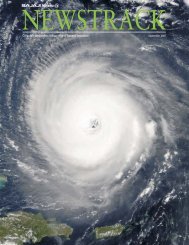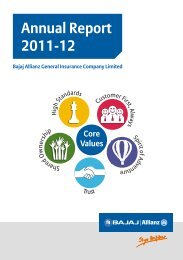Corporate Newsletter of Bajaj Allianz General Insurance Co. Ltd.
Corporate Newsletter of Bajaj Allianz General Insurance Co. Ltd.
Corporate Newsletter of Bajaj Allianz General Insurance Co. Ltd.
- No tags were found...
Create successful ePaper yourself
Turn your PDF publications into a flip-book with our unique Google optimized e-Paper software.
<strong><strong>Co</strong>rporate</strong> <strong>Newsletter</strong> <strong>of</strong> <strong>Bajaj</strong> <strong>Allianz</strong> <strong>General</strong> <strong>Insurance</strong> <strong>Co</strong>. <strong>Ltd</strong>.Vol - 1, Issue - 6 Nov - Dec 2003Dear Friends,I am delighted to interact with you in my firstcommunication after taking over as CEO <strong>of</strong> <strong>Bajaj</strong><strong>Allianz</strong> and take this opportunity to wish you andyour families a very happy 2004 and beyond.The first CEO <strong>of</strong> any company plays a critical roleas the foundations are laid in the initial years.Sam has brought this company to a stagewhere we have not only assumed theleadership position amongst the private playersright from the first year but have also achievedaccumulated break even in our first full year <strong>of</strong>operations. But more importantly, I feel thatSam has made a big impact on the culture <strong>of</strong> ourcompany which is hands on, performancedriven, open and gives every one anopportunity to grow. All <strong>of</strong> us have to always actin a manner which strengthens this culture.Sam has now assumed the role <strong>of</strong> <strong>Co</strong>untryManager and also CEO <strong>of</strong> <strong>Allianz</strong> <strong>Bajaj</strong> Life<strong>Insurance</strong> and we wish him luck in his newposition. This also <strong>of</strong>fers an opportunity for thetwo companies to work even closely and benefitfrom each other's resources.The performance <strong>of</strong> our company continues tobe good, we have crossed Rs. 330 crore inpremium income till December 2003, pr<strong>of</strong>it aftertax exceeds Rs. 16.5 cr and we are hopeful <strong>of</strong>achieving a combined ratio <strong>of</strong> less than 100% inthis financial year. The months <strong>of</strong> October andNovember were a bit tough for the generalinsurance industry as a number <strong>of</strong> big propertyclaims were reported. We also received a fewlarge claims, despite which we were able toachieve pr<strong>of</strong>itability for these two months.Some <strong>of</strong> the products recently introduced byus like event insurance, MTO liability policy andother speciality lines have received a goodresponse from the market. We intend to intensifyour efforts to develop this line <strong>of</strong> business in thecoming months. During this period we have alsotied up with two new banks viz. Saraswat Bank &Karnataka Bank with which our Bancassurancebusiness will grow especially in the West andSouth zones.The business environment continues to be verycompetitive. I foresee further reduction in ratesfor corporate clients and more pressure fromthe customers to further improve service levels.Thus going forward it should be our priority toimprove our renewal ratio and develop astrong agency force. We are taking some newinitiatives in Agency Development that willbe rolled out in the next couple <strong>of</strong> months.The committee set up by the IRDA onintermediaries has submitted their report. Thisreport has been published by IRDA for publicdebate. Some <strong>of</strong> the recommendations <strong>of</strong> thecommittee on special discount, bancassurance,access to database and pure risk rates are <strong>of</strong>wide ramification. Moving from tariff to purerisk rate in my opinion is a step backward.Any liberalisation from tariff should be towardsdetariffing only, let us not give tariff anothername. Similarly the recommendations to keepbanks away from distribution on the premisethat they get claims paid, composite brokersnot be allowed etc do not appeal to me. Otherthan claims arising out <strong>of</strong> insurance <strong>of</strong> NPAs,banks are not direct beneficiaries <strong>of</strong> any claim,they just credit the claim amount in the insured'saccount. If banks should not be allowed todistribute general insurance due to this conflict<strong>of</strong> interest, how they have been allowed topromote insurance companies in the first place,is another matter which seems to have skippedthe committee's deliberations. Tomorrow motordealers would not be allowed to sell motorinsurance as they get motor claims paid. Instead<strong>of</strong> increasing distribution channels let us notreduce the existing ones.The reinsurance in our country is still looked atfrom the foreign exchange angle. Today ourforex reserves exceed $100 billion, assumingthat a few brokers increase the reinsuranceoutgo due to being composite brokers, theoverall outgo would not exceed $ 5-10 millionin a year. I hope 2004 is the year when we willstop looking at reinsurance purely fromperspective <strong>of</strong> saving forex as the CentralGovernment is taking all steps to increase forexspending.For IRDA the agenda for 2004 is to take thereforms and liberalisation process further.Since the nineties we have seen that thedirection <strong>of</strong> reforms is just one way i.e. forward,the pace might vary. Thus I believe that we willhave detariffing sooner than later. For us as acompany, the challenge is to develop skills thatcan hold us when detariffing actually happens.With our actuaries we are in the process <strong>of</strong>developing rating engines for retailproducts. Also, a multi-disciplinary team <strong>of</strong>pr<strong>of</strong>essionals is being formed to developrating parameters for corporate clients.Under the circumstances it is <strong>of</strong> great valuethat we are able to attract and retain talentedpeople in our company. Sreenivasan has joinedus as CFO (Designate) while Anamika hasjoined as National <strong>Co</strong>ordinator (AgencyDevelopment).I look forward to your continued support,With warm regards,Kamesh Goyal01
<strong>Bajaj</strong> <strong>Allianz</strong> NewstrackChanges at the Top ManagementWe are happy to inform you that Sam Ghosh has taken over as <strong>Co</strong>untry Manager and also CEO <strong>of</strong> <strong>Allianz</strong> <strong>Bajaj</strong> Life <strong>Insurance</strong> and Kamesh Goyal hastaken over as our new CEO with effect from 1st Jan2004.CEO at Forums8th CII’s <strong>Insurance</strong> SummitSam Ghosh making a pointBusiness Standard, a leadingbusiness daily organised aRound Table discussion onthe most widely useddistribution channel -Banks.The topic <strong>of</strong> the discussionwas - Banncassurance is afailure in India.Our CEO was invited for theRound Table discussion.Participants included fromour other companies also.Sam Ghosh, was the onlyparticipant from the generalinsurance industry.Sam addressing the delegates <strong>of</strong> CII’s 8th <strong>Insurance</strong> Summit 2003CII held its 8th <strong>Insurance</strong> Summit at Hyderabad. Thetheme was “Realising the Growth Potential”. SamGhosh was one <strong>of</strong> the speakers <strong>of</strong> the summitTie-UpsKARNATAKA BANKKarnataka bank <strong>Ltd</strong>., has recently signed a MOU with<strong>Bajaj</strong> <strong>Allianz</strong> <strong>General</strong> <strong>Insurance</strong> to distribute ourproducts to its customers.Ananthakrishna, Chairman & CEO, Karnataka Bank <strong>Ltd</strong>.,said , " This tie-up is a significant move in our mission tobecome an integral solution provider." The 79 year oldKarnataka Bank's total business was in the region <strong>of</strong>Rs.12,000 crore and it earned a net pr<strong>of</strong>it <strong>of</strong> Rs. 110 crorefor 2002-03.The bank has a national presence with anetwork <strong>of</strong> 364 branches across 15 states and 2 unionterritories.Sam Ghosh & S. K. Banerji, MD, exchangingthe MOU <strong>of</strong> the tie-upSARASWAT BANKSaraswat Bank, the largest among the co-operativebanking sector signed a MOU for distribution <strong>of</strong> generalinsurance products with <strong>Bajaj</strong> <strong>Allianz</strong> <strong>General</strong> <strong>Insurance</strong><strong>Co</strong>. on 27th November 2003.S.K.Banerji, Managing Director, Saraswat Bank said, thetie-up would ensure the availability <strong>of</strong> various needsbased general insurance products & quality service to ourcustomers.Sam Ghosh & Ananthakrishna exchanging theMOU <strong>of</strong> the tie-up02
First Half Results 2003-2004Claim SettlementIn this issue we feature the claimsettlement <strong>of</strong> M/s Amitech Pipe-Systems (I) Pvt. <strong>Ltd</strong>.Client :M/S. Amitech Pipe Systems (India) Pvt<strong>Ltd</strong>.M/S. Amitech Pipe Systems (India) Pvt<strong>Ltd</strong>. is a joint venture between AmiantitHoldings, Saudi Arabia, a leadingmanufacturers <strong>of</strong> Glass ReinforcedPolyester (GRP) tanks world wide andMr. Shivanand Salgaonkar, a leadingindustrialist from Goa withshareholding in the ratio <strong>of</strong> 70%: 30%<strong>Co</strong>ver :Project <strong>Insurance</strong> which included EAR,Fire, Marine etc.What HappenedThe Tank Ribbing Machines had beenimported from Flowtite, Norway. Allprocess parts, components, electricaland control systems were imported.After the reportedly successful test <strong>of</strong>the dry ribbing, a full scale appliance <strong>of</strong>ribs was also done in the morning <strong>of</strong>November 6, 2003. Suddenly therewere two explosions in quicksuccession at about 11:20 hours onNovember 6, 2003.A Norwegian engineer, Mr. ArvidSundboe, was doing commissioning <strong>of</strong>the Ribbing Machine. The activities onthe day <strong>of</strong> the incident are not preciselyknown as the two persons who werepresent in the area and/or involved inthe commissioning activity, died as aconsequence <strong>of</strong> injuries sustained inthe accident. A fire followed theexplosions, which was on account <strong>of</strong>splashed out resin and / or catalyst. TheFire Brigade was alerted and tenderscame from Bicholim, Mapusa andValpoi. The fire was localised aroundthe machine. The fire brigade camereportedly within 30 minutes anddoused the fire. The estimated loss wasRs. 1 crore approx.Role <strong>of</strong> <strong>Bajaj</strong> <strong>Allianz</strong>Immediately on receipt <strong>of</strong> telephonicintimation about the incident at 11.45,a preliminary surveyor was appointedand by 12.30 the our Manager(Technical) along with the surveyor hadreached the site to take stock <strong>of</strong> thesituation.. The <strong>of</strong>ficials <strong>of</strong> Amitech whowere quite shocked with the accidentwere relieved to find the insurancecompany responding so quickly. Thevery same day, Mehta & Padmsey fromMumbai were appointed for the finalsurvey and Mr. Saumil Mehta flew inthe very next day and carried out thesurvey. In the evening, a joint meeting<strong>of</strong> the representatives <strong>of</strong> the insured,insurer and the surveyor was convenedand the entire claim process anddocumentary requirements wereexplained to the client.After a series <strong>of</strong> discussions andconstant follow-up with the insured, allthe documents were received on 19thDecember 2003 and the final reportwas released on 23rd. December 2003.The claim was processed and wasapproved for payment for Rs.81,89,055/- on 26th December 2003.Lessons LearntNovember - December 2003Deliver In Moments Of TruthThis was the moment <strong>of</strong> truth for us.Our entire team at Goa <strong>of</strong>fice realizedthat they needed to deliver when itmattered most and they did exactlywhat was expected <strong>of</strong> them. We at <strong>Bajaj</strong><strong>Allianz</strong> have been working to fulfill thevision <strong>of</strong> being the first choice insurerfor customers and this is only a smallstep towards that. We can perform stillbetter.Initially when the project insurancewas being discussed with variouspublic sector companies, Amitech alsodecided to invite some privatecompanies. The Techno Marketingteam <strong>of</strong> <strong>Bajaj</strong> <strong>Allianz</strong> made apresentation on Project <strong>Insurance</strong>. TheDirectors <strong>of</strong> the company was soimpressed with the pr<strong>of</strong>essionalapproach <strong>of</strong> <strong>Bajaj</strong> <strong>Allianz</strong> that theydecided to place 100% business withBAGIC.Client's reactionWhen asked how he felt about handlingthe claim, Mr. Shivanand Salgaocar,MD, who is a stakeholder in thecompany said, '' It is simply amazing.”The manner in which the claim hasbeen dealt with has only strengthenedour trust in them and the least we cando is tell other <strong><strong>Co</strong>rporate</strong>s about ourexperience.''03
Our Customer Speaks<strong>Bajaj</strong> <strong>Allianz</strong> NewstrackIn our series <strong>of</strong> interviews with ourpartner, we feature an interview <strong>of</strong>Mr. A. R. Fazili, <strong>General</strong> Manager, J &K Bank, our leading BancassurancePartner.Interview with <strong>General</strong> ManagerMr. A R Fazili, J & K BankQ. You are personally involved with the tieupsand various initiatives <strong>of</strong> J&K Bank.What was your objective to marketgeneral insurance products?A. In modern times the stress is nowon relationship banking. EveryBanker has to cater to the entireneeds <strong>of</strong> his customers may thatbe his finances, mutual funds,pension and last but not the leastinsurance. Having felt the pulse <strong>of</strong>the market and the demands <strong>of</strong>our customers the J&K Bank hadno option but to transform all its465 branches into financial supermarkets where we can <strong>of</strong>ferbasket <strong>of</strong> financial products toour customers. The customers <strong>of</strong>Banks no more need to walk intothe branches, infact they canswitch on their laptops and usetheir home as their <strong>of</strong>fice as well.They have no time to go frombank branch to the insurancecompany because the banker hasto act as his financial advisor justlike a doctor who attends to hispatients. Since insurance is a partand parcel <strong>of</strong> the financial needs<strong>of</strong> customers, J&K Bank had tothink <strong>of</strong> <strong>of</strong>fering insuranceproducts to its customers out <strong>of</strong>basket <strong>of</strong> financial needs. Thusthe need for our tie-up with <strong>Bajaj</strong><strong>General</strong> <strong>Insurance</strong> <strong>Co</strong>mpany. Onemore reason, though not themain reason, is to increase andsupplement fee based income <strong>of</strong>Bank by earning a small portion<strong>of</strong> the pie. The interest rate inadvances has been experiencingMr. A. R. Fazili, <strong>General</strong> Manager, J & K Bankdown ward trend and the bottomlines <strong>of</strong> Banks are drying up.Therefore the Banks have to lookfor alternative avenues <strong>of</strong> incomeand the insurance being one <strong>of</strong>them.Q. What were your prime considerationswhen deciding a tie-up with an insurancecompany?A. The spread <strong>of</strong> our branches isfrom corner to corner in the entirecountry and the bank has beenranked No.1 private sector. Bankfrom amongst the new generationforeign and private sector banks.Our presence is almost in everybig city <strong>of</strong> India and we have staffstrength <strong>of</strong> more than 7000employees who are working asour ambassadors. Not onlydedicated manpower but evenother infrastructure is alreadythere. Therefore the bank had nodifficulty in assigning insuranceresponsibilities to its staffmembers for looking intolegitimate needs <strong>of</strong> its customers.Customer care is an importantfactor by <strong>of</strong>fering a convenientwindow for banking andinsurance products under onero<strong>of</strong>. So the network <strong>of</strong> the Bankwith its dedicated employees is animportant factor in channelizing<strong>of</strong> financial products and <strong>of</strong>feringthem to the customers. In moderndays <strong>of</strong> competition you can notdo without <strong>of</strong>fering the best <strong>of</strong>products and services and that isthe reason why we had to selectone <strong>of</strong> the best insurancecompanies for tie-up. <strong>Allianz</strong> is aworld wide name in insuranceand so is <strong>Bajaj</strong> in India which hasearned a great reputation inindustrial circles. Both thesenames have a vast experience intheir respective fields andobviously we had no difficulty indeciding about the <strong>General</strong><strong>Insurance</strong> partners.Q. Having tied up with <strong>Bajaj</strong> <strong>Allianz</strong>, are yousatisfied with the working relations?A. Now it is our second year <strong>of</strong>operation with <strong>Bajaj</strong> <strong>Allianz</strong> yetwe feel that the relationship is ageold as if we have been workingtogether since decades. We havesuch a nice relationship andcoordination that there is hardlyany difficulty in our working.B. In view <strong>of</strong> the changing customerexpectations after liberalization<strong>of</strong> insurance sector, <strong>Bajaj</strong> <strong>Allianz</strong>04
November - December 2003should take the necessary remedial measures toovercome the below mentioned difficulties beinggenerally faced by the customers:i) In case <strong>of</strong> motor insurance particularly in accidentalclaims surveyors come unannounced and afterseveral days (especially in rural areas) and thecustomer is unable to meet him and explain his caseface-to-face. The company generally approves theclaims for amount much less than “Repair Estimate”submitted by the customer.ii) In case <strong>of</strong> theft or total loss, claim settlement processis lengthy and cumbersome; the claimant has toproduce FIR and other documents to the company. Intheft case <strong>Co</strong>mpany awaits “non-recovery closure” <strong>of</strong>cases by police before settling the claim. For thisreason claim settlement gets delays.There are some other areas also where there is a lot <strong>of</strong>scope <strong>of</strong> improvement:a) <strong>Bajaj</strong> <strong>Allianz</strong> should immediately make arrangementsfor issuing the policy bonds from their Srinagar <strong>of</strong>fice;b) The existing skilled/trained manpower in <strong>Bajaj</strong> <strong>Allianz</strong>local <strong>of</strong>fices should be augmented to cope up with theincreasing volume <strong>of</strong> business being referred to byJ&K Bank branches to the company.Q. <strong>Bajaj</strong> <strong>Allianz</strong> is committed for a long-term relationship with J&KBank. What do you think are other innovative steps that we cantake jointly to provide the best possible solutions to ourcustomers?A. A lot <strong>of</strong> integration has to be done in this direction:i) Mass campaign for customer awareness about <strong>Bajaj</strong><strong>Allianz</strong> products through electronic/print media,thereby giving full features <strong>of</strong> a particular product.This will help taping the untapped business, whichconstitutes about 15%.ii) Establishment <strong>of</strong> credibility <strong>of</strong> <strong>Bajaj</strong> <strong>Allianz</strong> to makeits presence felt by the people especially in the state <strong>of</strong>J&K, where the public sector insurance companieshave been the leading players for decades.iii) To enhance coordination between the J&K Bank and<strong>Bajaj</strong> <strong>Allianz</strong> functionaries at all levels in order toensure the implementation <strong>of</strong> the policy decisionseffectively.iv) There should be a mechanism in place at all J&K Bankbranches for calculation <strong>of</strong> commission on thebusiness referred to <strong>Bajaj</strong> <strong>Allianz</strong> by a particularbranch. <strong>Co</strong>mmission should directly be remitted by<strong>Bajaj</strong> <strong>Allianz</strong> to the branches.Dealers MeetAn Auto Dealer Meet was organised by our Chennai &Bangalore <strong>of</strong>fices to address some key points/issues <strong>of</strong>our relationship with Dealers, Customers, ServiceEngineers & SurveyorsThe purpose <strong>of</strong> the Meet was :1) to strengthen our relationship at the operational level2) have first hand knowledge <strong>of</strong> how they felt about ourservices, procedures3) expand our relationship on a mutually beneficialbasis.Meet at ChennaiA Service Engineers meet was held at Bangalore. ServiceEngineers from all our <strong>of</strong>fices attended the meet. Mr.Vijay Kumar addressed them during the meet.Meet at BangaloreSome <strong>of</strong> the Service Engineers shared their knowledge,experience in their respective areas.05
November - December 2003Global RisksREPORTNews and views <strong>of</strong> risk management 4/2003White-<strong>Co</strong>llar Crime :The Hidden RiskWhite-collar crime in companies is a risk no one likes to talk about openly, particularly if itis perpetrated by your own employees. But research shows that it is becoming an increasingthreat with catastrophic potential. In the worst case, it may even lead to insolvency.BY SABINE ENSELEIT06
<strong>Bajaj</strong> <strong>Allianz</strong> Newstrackn Germany, company directors estimate annualeconomic losses in their country caused by white -collar crime <strong>of</strong> up to ¤100 billion. By contrast, in theirown companies, everything is under control, theybelieve, falling victim to a serious misapprehension.“Theft, fraud, embezzlement and misappropriation <strong>of</strong>funds by a company’s own employees are increasinglybecoming an everyday occurrence in business,” saysClemens von Weichs, Chairman <strong>of</strong> the Board <strong>of</strong>Management at Euler Hermes Kreditversicherungs-AG.The most recent study by the credit insurer presentsimpressive evidence for this assertion. A full one-third <strong>of</strong>all companies in Germany with turnover exceeding ¤1million became victims <strong>of</strong> white-collar crime over the past3 years. In three-quarters <strong>of</strong> these cases their ownemployees were involved.This puts Germany squarely in the middle <strong>of</strong> theWestern European average where, according to a study onthe UK by Pricewaterhouse<strong>Co</strong>oper (PwC), around 34percent <strong>of</strong> all companies suffer losses due to white-collarcrime. In international terms, this figure is relativelyfavorable, since another study, “Global Economic Crime2003.” by PwC in cooperation with the American law firmWilmer, Cutler & Pickering, shows that some 37 percent <strong>of</strong>companies are affected in the US , white in France thefigure is 43 percent and in the UK more than half. See fig. 1for the regional breakdown <strong>of</strong> white-collar crimesreported.Despite such statistics, many companies still do nottake the danger seriously. Thus according to the EulerHermes study, some 86 percent <strong>of</strong> the respondents inGermany see white-collar crime as a serious problem ingeneral, yet not even one tenth <strong>of</strong> managers think that theyrun an elevated risk <strong>of</strong> criminal actions by their ownemployees. This attitude can be seen in almost all theindustrialized countries, with the possible exception <strong>of</strong> theUK, where the number <strong>of</strong> respondents acknowledgingthese risks is higher than on the <strong>Co</strong>ntinent or in America orAsia. This does not necessarily mean that the incidence <strong>of</strong>white-collar crime in the UK is higher. It may just reflect amuch stronger awareness and greater tendency to noticecrime in companies, so that it is much more in the publiceye than elsewhere.The type <strong>of</strong> losses, however, also differ significantly inthe UK from those in other industrialized countries. Thus,the level <strong>of</strong> asset misappropriation, such as paymentdiversion, is substantially higher than in other regions,white bribery, embezzlement or pirating <strong>of</strong> products is wellbelow the average, according to the PwC UK survey. Thismay indicate that the UK does too little to prevent assetmisappropriation, particularly at a time <strong>of</strong> globally weakgrowth. It would be regrettable, since this type <strong>of</strong> crime isgenerally regarded as one against which companies cantake effective precautions.But asset misappropriation is the most frequentlyreported crime in the US too, making up 25 percent <strong>of</strong> alllosses, followed by cybercrime. A particularly striking fact,though, is that more than half <strong>of</strong> all the companies canvassedin the US believe that financial misrepresentation is far andaway the most frequently occurring form <strong>of</strong> white-collar crime,white in fact it only accounts for a mere 2 percent <strong>of</strong> reportedcases. This is obviously a result <strong>of</strong> the wide media coveragegiven to a few spectacular cases <strong>of</strong> financialmisrepresentation, like balance sheet falsification in the US,with losses running into the tens <strong>of</strong> hundreds <strong>of</strong> million <strong>of</strong>dollars. And it also shows that the companies see a strongthreat to their finances and reputation from such activities,even if the crime seldom occurs.High loss frequency and volumeBy contrast, in Germany, more than half <strong>of</strong> all internal crimesconcern theft, indicates that Euler Hermes Kreditversicherungstudy. Roughly one-third <strong>of</strong> companies suffer losses due tovarious type <strong>of</strong> fraud. such as embezzlement andmisappropriation <strong>of</strong> funds. Most <strong>of</strong> the perpetrators are inpositions <strong>of</strong> trust and have direct access to the flow <strong>of</strong> funds.07
November - December 2003In one typical example, a 43-year old accountant in apublishing house siphoned <strong>of</strong>f a total <strong>of</strong> ¤ 350,000 overseveral years. She took advantage <strong>of</strong> her superior’s trustand repeatedly transferred small or medium-sized sumsfrom the business account to other account numbers. Sheused the money to pay for cars and expensive holidays.Fig.1Indications <strong>of</strong> white-collar crimesreported by regions(as a percentage <strong>of</strong> survey respondents)UKWestern EuropeCentral &Eastern EuropeSouth &Central AmericaNorth AmericaAsia & PacificAfrica610101111151212152421300 10 20 30 40 50 60 70 80 90Asset misappropriation<strong>Co</strong>rruption and briberyProduct piracySource: Pricewaterhouse<strong>Co</strong>opers, Economic Crime Survey 2003-United KingdomFig.222Global impat <strong>of</strong> business crime(as a percentage <strong>of</strong> corporate respondents)ReputationBrand imageShare priceStaff moraleBusinessrelationship31303135374448470 10 20 30 40 50 60 70 80 90Long termShort termSource: Pricewatehouse<strong>Co</strong>opers, Global Survey on Economic Crime 2003, publishedin association with the law firm <strong>of</strong> Wilmer, Cutler & Pickering56576567697173757382Of the 402 companies questioned by Euler Hermes inGermany, companies fell victim to internal crimes 7 times onaverage over the past 3 years. The average loss reached¤73,000 , and losses from cases discovered totaled ¤23.2billion.This is the reality in Germany as seen in the statistics. Yet itclearly does not tell the full story. In fact, the Euler Hermesstudy also revealed that 64 percent <strong>of</strong> respondents suspectedthat they had incurred a loss over the past 3 years, but that ithad gone unnoticed. This raises the suspicion that a very highpercentage <strong>of</strong> white-collar crimes in Germany goesundetected.Increasing trendWhat motivates growing numbers <strong>of</strong> employees toknowingly inflict losses on their companies? Surveyrespondents saw the cause mostly in a general deterioration <strong>of</strong>values and the slow economy, which leads to fiercercompetition and a general hardening <strong>of</strong> attitudes in thestruggle to make ends meet. The employees concerned <strong>of</strong>tenalso have personal problems with serious financialconsequences, such as an addiction to gambling or anexaggerated need to impress others. Many <strong>of</strong> the reasons lie,however, in developments in the modern working world, inwhich loyalty, responsibility and reliability take a secondplace to flexibility, cost-cutting, lean management andshareholder value. Figure 2 shows the global impact <strong>of</strong> whitecollarcrime.Interestingly, some 7 percent <strong>of</strong> respondents said their ownmanagement level was especially at risk <strong>of</strong> perpetratingwhite-collar crime. Essentially, the employees who were mostable to inflict the greatest damage on a company were thosewith extensive knowledge <strong>of</strong> its internal workings. Asexpected, departments and positions in direct contact withgoods, accounting or cash payments were also seen as beinghigh-risk.More and more people seem to be prepared to inflict losseson their own company. At least, this is the fear expressed byteh horizon. Moreover, some 58 percent expected crime incompanies to rise. In the US, 84 percent <strong>of</strong> companies seewhite-collar the crimes most frequently mentioned were assetmisappropriation (53 percent), cybercrime (30 percent) andfinancial misrepresentation (17 percent).To have some employees enriching themselves illegallycan assume a life-threatening dimension for the companysuffering the loss. In some circumstances, It may be thrown <strong>of</strong>fbalance with out any prior warning, and companies do notalways have the risk provisioning capacity to compensate forthe loss. Entrepreneurs who do not have insurance to coversuch an unexpected risk are left to deal with it as best they can- alone. In extreme cases, this can put the survival <strong>of</strong> the entirecompany into question.The necessary protectionAlthough companies are aware <strong>of</strong> the increasing threatfrom crime in companies, 88 percent <strong>of</strong> those in Germanyconsider the precautions they have taken to be sufficient. Thefigure in the UK is slightly lower at 85 percent, but 81 percent <strong>of</strong>08
<strong>Bajaj</strong> <strong>Allianz</strong> Newstrackthe man agers surveyed said that they had substantiallytightened their control procedures in the preceding yearand were thus better protected from white-collar crime thanother international enterprises. A full 95 percent <strong>of</strong>companies in the US regarded their risk management in thisarea as highly sufficient.However, the findings in Germany show that as much as30 percent <strong>of</strong> cases only come to light by coincidence andalmost one-quarter due to information from customers andsuppliers. Systematic warning through internal controlsystems and internal auditing departments, on the otherhand, only reveal 8 percent <strong>of</strong> crimes. In the US, similarly, 36percent <strong>of</strong> crimes in companies are discovered throughinformal tip-<strong>of</strong>fs are only half by means <strong>of</strong> systematiccontrols.Nevertheless,prevention is one <strong>of</strong> themost effectiveinstruments for limitinglosses. Effective controland regulatory systems,clear companyguidelines andtransparent structurescan all significantlyreduce the risk. In thelast resort, however, itis not possible toprevent every whitecollarcrime by means <strong>of</strong>the preventivemeasures taken.Anyone who knows the measures can circumvent them.<strong>Insurance</strong> coverage against economic losses due to crimescommitted by employees in a company, known as fidelityinsurance, can be a suitable means <strong>of</strong> reducing the risks, inaddition to the preventive measures mentioned earlier.A full three-quarters <strong>of</strong> US companies take out insurancecoverage against economic losses from white-collar crime,while the world average is only about 50 percent. Only 37percent <strong>of</strong> companies in the US have actually made claimson such losses, however, and 80 percent <strong>of</strong> theindemnification paid out was for only most <strong>of</strong> the cases <strong>of</strong>economic crimes in companies in the US are <strong>of</strong>comparatively small volume and remain below thethreshold required for making a claim.Top <strong>of</strong> the league in insuring themselves against whitecollarcrime, however, are the companies in the UK, wherethe percentage <strong>of</strong> companies insured is higher than in mostother industrialized countries. And, fidelity insuranceagainst losses caused by a company’s own employees isthe leading type <strong>of</strong> insurance purchased.Euler Hermes Kreditversicheurung, for its part, <strong>of</strong>fersfidelity insurance to German-based companies and theirforeign subsidiaries, covering them against economiclosses caused by their own employees. Fidelity insurancehas a role to play wherever employees are entrusted withthe administration and handling <strong>of</strong> company assets. It is notdependent on the sector or the size <strong>of</strong> a company and payscompensation for losses caused by unlawful acts willfullyperpetrated by employees. These are mainly losses due totheft, but also include embezzlement, fraud, computerfraud, misappropriation <strong>of</strong> assets and other willful unlawfulacts such as damage to property (sabotage). <strong>Co</strong>verage isworldwide and includes all designated companies in whichthe insured holds more than 50 percent <strong>of</strong> the shares."The article is reprinted with permission from the <strong>Allianz</strong> Global RisksREPORT magazine, issue 4/2003. This quarterly magazine focuses oncorporate risk management. For more information, seewww.agr.allianz.com/magazine”09
November - December 2003<strong>Bajaj</strong> <strong>Allianz</strong> in the NewsThe Hindu Business Line4th Dec 2003The Economic Times Pune4th Dec 2003Business Line15th Dec 2003The Financial Express4th Dec 2003The Hindu6th Nov 2003Business Standard4th Dec 2003Dinnakaran16th Dec 2003Deshabhimani9th Nov 2003Eenadu15th Dec 2003Mathrubhoomi10th Nov. 2003Economic Times15th Dec 2003The Economic Times28th Nov 2003Daily Excelsior18th Dec 2003Business Standard15 Dec 2003The Financial Express15th Dec 200311
<strong>Bajaj</strong> <strong>Allianz</strong> NewstrackFinsure 2003 - RajkotMAHA EXPO-2003 - AurangabadUnion HRD Minister Vallabh Kathiriainteracting with our Rajkot Team.Vivek Trade Links and RISPL <strong>Insurance</strong> Brokersorganised Finsure 2003 at Rajkot on 26 Dec 2003.The event was first <strong>of</strong> its kind in Saurashtra and allthe <strong>General</strong> and Life <strong>Insurance</strong> <strong>Co</strong>mpanies, MutualFund <strong>Co</strong>mapnies, Leading Private and Public SectorBanks, Investment <strong>Co</strong>nsultants, and financecompanies participated in it.Our Aurangabad Team handing over thePolicy to customer at Maha Expo.The Mega event <strong>of</strong> Aurangabad, Maha Expo was held atGarware Grounds. Our Aurangabad <strong>of</strong>fice participated inthe event and received some good leads in the SME sectorand also queries for the Retail products.The event met with an encouraging response fromall sections <strong>of</strong> trade commerce and industryincluding the media.Our Rajkot <strong>of</strong>fice participated & won the trophy for"Most Interactive Stall on <strong>General</strong> <strong>Insurance</strong>.”Our AmbassadorsTrevor Rodrigues presented a paperon "Do not employ employees whohate customers" where he stressedon the need for training andrevitalising employees in an effort otensure that interactions withcustomers bonds into a fruitful winrelationship for all. Trevor was alsoinvited to address queries at the end<strong>of</strong> the seminar.12TrevorRodrigues ,ManagerTraining wasinvited to give atalk in aninternationalseminarEditor - Santosh BalanWe would like to hear from you. Please send your contributions in the form <strong>of</strong>News, Events, Articles etc. to santosh.balan@bajajallianz.co.in* Views / Information expressed herein are illustrative and informative in nature and not binding on the company.<strong>Insurance</strong> is the subject matter <strong>of</strong> the solicitation.Amit Sinha, RM, Delhi handing over the award to thewinners <strong>of</strong> Industry Galileo Express Travel & TourismAwards’03 held at Delhi. <strong>Bajaj</strong> <strong>Allianz</strong> <strong>General</strong> <strong>Insurance</strong>was the Associate Sponsor for the Event.Take - It - Easy


